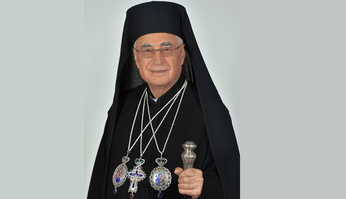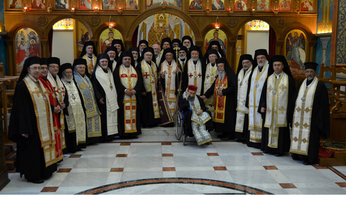Patriarch Youssef
Address of His Beatitude at the conference on "Women and their role in an era of change" - Liqaa
Speech of H. B. Gregorios III (Laham)
Melkite Greek Catholic Patriarch of Antioch and All the East,
of Alexandria and of Jerusalem
Conference on “Women and their role in an era of change”
Liqaa (Meeting) – a global centre
for inter-civilisational Dialogue
3 May 2012
Dear sisters and brothers
I have great pleasure in welcoming you to the Liqaa (Meeting) centre and inaugurating this conference. You will also be very welcome to organise your conferences in our centre.
In the latter half of the twentieth century, women in the Arab world began to acquire rights equal to men at all levels (voting rights and the right of standing for office, the right to work, etc.). Yet, we find today that there is still a disparity linked to the nature of politics in certain countries, namely, those which still adopt a religious political stance.
During the events that have overtaken the Arab world over the past year and up till now, women have been taking part in peaceful demonstrations calling for the implementation of change. However, the current revolutions unleashed from the end of 2010 up to the present have induced and incited subversive religious tendencies.
Indeed, following the coming to power of new regimes as a result of on-going revolutions in the Arab world, the role of women is suffering a remarkable decline. We can in fact see a falling away of rights already acquired by women, such as the right to participate in political life and work and legal protection from tribal customs. This worrying state of affairs also affects all other aspects of the country’s life, such as personal liberties, freedom of thought and expression, the devolution of power, etc.
Women’s roles then are bound up with the kind of society that today’s Arab citizens want. Of course, the civil state guarantees women’s rights, though many aspects need further development, especially through men and women’s faith outlook. International charters call for women’s role in the constitution to be approved, as well as legislation and protection by means of law courts.
Clear measures with a view to protecting the significant role of women can be found in the “Convention on the elimination of all forms of discrimination against women ” adopted by the United Nations General Assembly (UN) in 1979 and binding upon all countries that have ratified the convention.... These rights are unfortunately not taken into consideration by the current revolutions.
Equality through excellence
Now I as a Christian have to put forward my view of women, as each of us has to enrich the other through faith in God and neighbour.
Jesus Christ’s view
Jesus Christ’s view of women is not based on equality between men and women, but gives a unique role for each in relation to the other. During his daily life in the Jewish community, Jesus arouses the perplexity of his contemporaries due to his way of adopting undesirable, even forbidden habits: sitting with sinners, touching lepers, talking to tax collectors and interacting with all Jewish groups despite their differences and certainly treating women differently.
I would like to mention the Apostolic Letter of Blessed Pope John Paul II, “The dignity and vocation of women” (Mulieris dignitatem 15 August, 1988 ) on the occasion of the Marian Year. We should remember how Jesus Christ defended the dignity and personal vocation of women. On the level of women’s marital role, Jesus Christ explained in detail to his contemporaries the framework in which Mosaic divorce law was given, just as he emphasised creation’s essential purpose, that “all may be one.” (John 17: 21) “What therefore God hath joined together, let not man put asunder.” (Mark 19: 6)
These actions have multiple implications. In that way, Christ redirects human history towards God’s essential objective. Male and female are in the image and likeness of God and together progress along the road to eternal salvation. The Apostolic Letter “The dignity and vocation of women” says: “The principle of this ’ethos,’ which from the beginning marks the reality of creation, is now confirmed by Christ in opposition to that tradition which discriminated against women. In this tradition the male ’dominated,’ without having proper regard for woman and for her dignity... This ’ethos’ is recalled and confirmed by Christ's words...” (V, 12)
Women in the Bible
If we turn to study the presence of women in the Gospel, we see that it is characterised by diversity and singularity. In the Apostolic Letter “The dignity and vocation of women” we find a working out and explanation of that presence. In fact we find some of those women who became Jesus’ disciples had been sick but obtained healing and blessing. Jesus Christ cites several parables in which women figure, such as the wise virgins, the woman who lost a coin and others. John’s Gospel mentions the case of the woman taken in adultery. Jesus speaks to her with respect and love, far from any discrimination, since he was concerned only with her reformation. Among the most significant scenes of the Gospel can be counted the myrrh-bearing women who were more faithful to Jesus than his male apostles and who were therefore first to receive the news of the glorious resurrection.
That is Jesus’ approach to mankind: granting gifts to women and men alike and their own place in the saving purpose of God.
The Second Vatican Council’s view
The Second Vatican Council reflects this Gospel vision in the Pastoral Constitution called “Joy and Hope ,” (Gaudium et Spes) giving the following view: “Everyone must consider his every neighbour without exception as another self, taking into account first of all his life and the means necessary to living it with dignity.” (Joy and Hope, 27) The constitution also adds that the evangelical vision of the human being requires real equality in human dignity among all to be increasingly recognised. The document reminds us: “True, all men are not alike from the point of view of varying physical power and the diversity of intellectual and moral resources. Nevertheless, with respect to the fundamental rights of the person, every type of discrimination, whether social or cultural, whether based on sex, race, colour, social condition, language or religion, is to be overcome and eradicated as contrary to God's intent. For in truth it must still be regretted that fundamental personal rights are still not being universally honoured. Such is the case of a woman who is denied the right to choose a husband freely, to embrace a state of life or to acquire an education or cultural benefits equal to those recognized for men.” (Joy and Hope, 29)
The Virgin Mary, a model of convergence among Christians and Muslims in today’s society
Today’s reality obliges us to think about means to reach agreement about the role of women in our society. This suggests the prophetic role that the Virgin Mary played in the convergence of perspectives of members of the same nation, since her glorification is shared. The Virgin Mary plays a role in the saving plan of God recognized in both Gospel and Qur’an. This could provide common grounds for discussing the role of women. She is a kind and caring mother who having experienced the loss of her beloved son, continues to guide upcoming generations to God.
1. The Virgin Mary an exemplary mother in society
The Virgin Mary has great significance for Muslims and Christians as God chose her and blessed her, just as he prepared her for giving birth to Jesus Christ. We also encounter a common belief that she became pregnant without intercourse with a man and remained intact before, during and after the birth of her son. Both religions alike glorify the Virgin Mary for her obedience and her reaction to God-given grace. Her modesty and simplicity are extolled by both religions as is her life dedicated to God and prayer. That is why all Lebanese have agreed to make the Feast of the Annunciation a national holiday. That is indeed a model of life dialogue superior to any other kind.
The practical aspect of that perspective is very fruitful for our research. Indeed, just as the Virgin Mary played a key role, women today ought to follow that example. As the Virgin Mary was able to fulfil the will of God in her life, so women today should be enabled to fulfil God’s will in complete freedom. This means that they must play a role in society, in religion thereby following the Virgin Mary’s example. So, achieving equality between men and women does not mean abolishing differences and distinctions between them but rather reconciling, integrating and complementing one another, each according to his or her given talents.
2. Women and motherhood
A woman may contribute fully to the process of creation just as she may support the family. Such a woman reflects the essence of dedicating one’s life to others as well as of self-giving. Returning to the Apostolic Letter on “The dignity and vocation of women,” we find that mutual self-giving through marriage may be crowned with the gift of new life. That God-given dignity belongs particularly to mothers and is a source of joy for them as the spouses share in the same task of creation with the Everlasting God. The letter states significantly that “motherhood implies from the beginning a special openness to the new person: and this is precisely the woman's ‘part.’” (The dignity and vocation of women, VI 18) Respect for life taking shape in the mother’s womb prohibits abortion or rejection of birth-giving. Everyone knows how much women suffer as a result of a miscarriage. Yet we should not consider motherhood to be the ultimate role for women any more than responsibility for the bringing up of children is theirs alone. In fact, as the couple’s life is based on partnership, each partner plays a role shared in the light of that partnership and mutual understanding.
Finally, we should like to emphasise the importance of the role of families in which mothers bind together their members. God gave families the distinct vocation of being the primary living cells of society. They fulfil their mission if they succeed in making their homes temples for God through their piety and the prayers of their members.
Thank you, dear friends and may God almighty bless you.
Recommendations
1. Strengthen the principle of non-discrimination against women, on the basis of the faith perspective that places women, alongside men, at the centre of God’s creation, whilst respecting their role that complements men’s.
2. Ask the new governments to confirm their commitment to respecting women’s role, by enshrining the faith perspective in society through requisite legislation to maintain women’s role today.
3. Make society aware of women’s special role in families and society by studying the example of the Virgin Mary or other women.
4. Emphasise the importance of motherhood as sharing in creation, thereby underlining the prohibition on abortion.
5. Broaden our faith perspective to include contemporary changes to do with women’s work and lifestyle so that faith should not be restrictive.
H. B. Gregorios III (Laham)
Melkite Greek Catholic Patriarch of Antioch and All the East, of Alexandria and of Jerusalem

